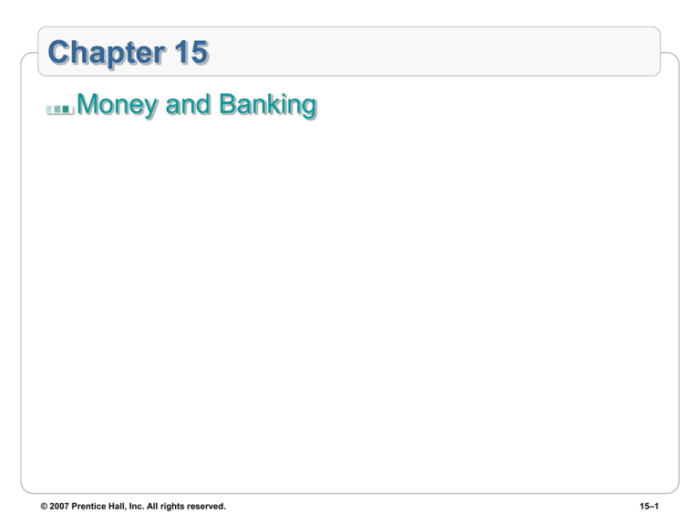Welcome to Money in Review Chapter 6, where we embark on a captivating journey into the world of personal finance, financial literacy, and the multifaceted role of money in our society. Get ready to unravel the intricacies of managing your finances effectively, navigating the complexities of financial decision-making, and exploring the ethical considerations that shape our relationship with money.
Throughout this chapter, we will delve into the fundamental concepts of personal finance, highlighting the significance of budgeting, saving, and investing in achieving your financial aspirations. We will uncover the profound impact of financial literacy, empowering you with the knowledge and skills to make informed choices that lead to financial well-being.
Money and Personal Finance: Money In Review Chapter 6

Personal finance involves managing your money effectively to achieve your financial goals. It encompasses budgeting, saving, and investing, helping you make informed decisions about your finances.
Budgeting allows you to track your income and expenses, ensuring you spend within your means. Saving is crucial for building an emergency fund and reaching long-term goals like retirement. Investing helps you grow your wealth over time, maximizing your financial potential.
Common Personal Finance Challenges
Many individuals face common personal finance challenges, such as:
- Living paycheck to paycheck
- Accumulating high-interest debt
- Lack of financial literacy
Overcoming these challenges requires a proactive approach, including creating a realistic budget, managing debt effectively, and educating yourself about financial concepts.
While Money in Review Chapter 6 provides valuable insights into financial literacy, expanding our understanding of historical events is equally crucial. For this, I recommend exploring APUSH Period 6 Key Terms . This resource offers a comprehensive list of terms essential for grasping the complexities of American history during this pivotal era.
By delving into these key terms, we can enhance our appreciation of Money in Review Chapter 6’s financial concepts within a broader historical context.
The Importance of Financial Literacy

Financial literacy is the ability to understand and manage one’s personal finances effectively. It encompasses a wide range of knowledge and skills, including budgeting, saving, investing, and debt management. Financial literacy is essential for individuals to make informed decisions about their money and achieve their financial goals.
Benefits of Financial Literacy
The benefits of financial literacy are numerous. Financially literate individuals are more likely to:
- Make informed financial decisions
- Avoid financial pitfalls, such as excessive debt or poor investment choices
- Achieve their financial goals, such as saving for retirement or buying a home
li>Increase their confidence in managing their finances
Consequences of Financial Illiteracy
The consequences of financial illiteracy can be severe. Financially illiterate individuals are more likely to:
- Make poor financial decisions that lead to debt, bankruptcy, or financial ruin
- Experience financial stress and anxiety
- Be taken advantage of by predatory lenders or financial advisors
Financial literacy is a critical life skill that everyone should possess. By understanding and managing their finances effectively, individuals can improve their financial well-being and achieve their financial goals.
Money and Society
Money plays a crucial role in the fabric of society, facilitating economic transactions, fostering growth, and shaping stability. It serves as a medium of exchange, enabling individuals and businesses to purchase goods and services, and as a store of value, allowing for the preservation of wealth over time.
Impact of Inflation and Deflation
Inflation, a sustained increase in the general price level, erodes the purchasing power of money, making goods and services more expensive. This can lead to a decline in economic growth and consumer spending. Deflation, on the other hand, occurs when the general price level falls, leading to a decrease in the cost of living.
While deflation can stimulate economic activity in the short term, prolonged deflation can lead to economic stagnation.
Government Policies and Monetary System
Governments play a significant role in shaping the monetary system through policies and regulations. Central banks, often independent entities, are responsible for managing the money supply and interest rates to maintain economic stability and promote growth. Fiscal policies, such as taxation and government spending, also influence the monetary system by affecting the demand for money and the overall level of economic activity.
Ethical Considerations in Money Management

In the realm of personal finance, ethical considerations play a pivotal role in shaping responsible and sustainable money management practices. Making ethical choices ensures that individuals prioritize fairness, transparency, and accountability in their financial dealings.
Financial Responsibility
Financial responsibility entails managing finances with prudence and avoiding excessive debt or overspending. It involves adhering to ethical principles and making informed decisions that align with one’s financial goals and values. Responsible money management promotes financial stability and prevents individuals from falling into financial distress.
Ethical Dilemmas
Money management often presents ethical dilemmas, such as:
- Borrowing money from friends or family without clear repayment plans
- Spending beyond one’s means to maintain a certain lifestyle
- Hiding financial information or debts from loved ones
Strategies for Ethical Choices
Navigating ethical dilemmas requires careful consideration and the adoption of ethical decision-making strategies:
- Identify the ethical implications of financial decisions
- Consider the impact on others, including creditors, dependents, and society
- Seek professional guidance if needed to clarify ethical issues
- Prioritize transparency and honesty in financial dealings
Future Trends in Money Management

The financial landscape is constantly evolving, and the way we manage and use money is no exception. Emerging trends such as the rise of digital currencies and fintech are reshaping the industry and offering individuals new and innovative ways to manage their finances.
One of the most significant trends is the growing adoption of digital currencies, such as Bitcoin and Ethereum. These digital assets are not backed by a central bank and operate independently of traditional financial systems. The decentralized nature of digital currencies has the potential to disrupt traditional payment methods and offer new opportunities for investment and financial inclusion.
Impact on Individuals
- Increased convenience and accessibility to financial services, especially for those who may have been underserved by traditional banking systems.
- New investment opportunities with the potential for high returns, but also increased volatility and risk.
- Greater control over personal finances and reduced reliance on intermediaries.
Impact on the Financial Industry
- Increased competition and disruption of traditional financial institutions.
- Development of new financial products and services tailored to the needs of digital currency users.
- Need for regulatory frameworks to address the risks and challenges associated with digital currencies.
Role of Technology, Money in review chapter 6
Technology is playing a pivotal role in the transformation of money management. Fintech companies are leveraging advancements in artificial intelligence, machine learning, and data analytics to create innovative financial solutions.
- Personalized financial advice and automated investment management.
- Improved fraud detection and risk management.
- Increased access to financial education and resources.
As technology continues to evolve, we can expect to see even more transformative trends in money management, further empowering individuals and reshaping the financial industry.
FAQ Resource
What is the significance of personal finance?
Personal finance empowers individuals to manage their money effectively, make informed financial decisions, and achieve their financial goals.
Why is financial literacy essential?
Financial literacy provides individuals with the knowledge, skills, and confidence to make sound financial choices, reduce financial stress, and improve their overall well-being.
How does money impact society?
Money serves as a medium of exchange, facilitating economic growth and stability. It influences inflation, deflation, and government policies, shaping the financial landscape.
